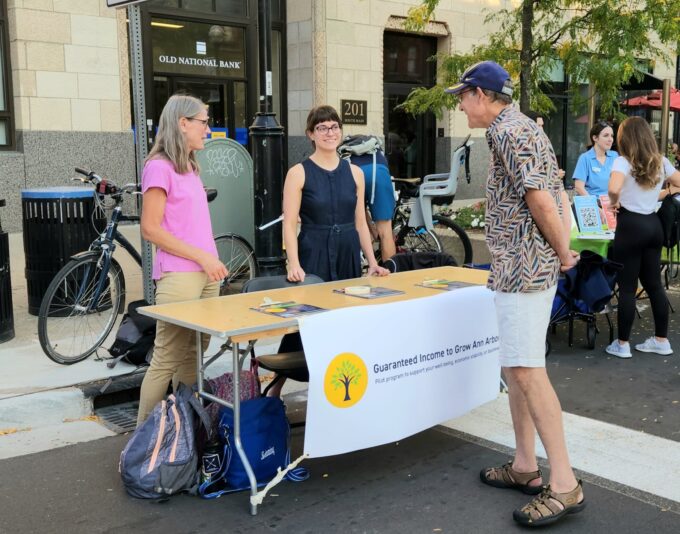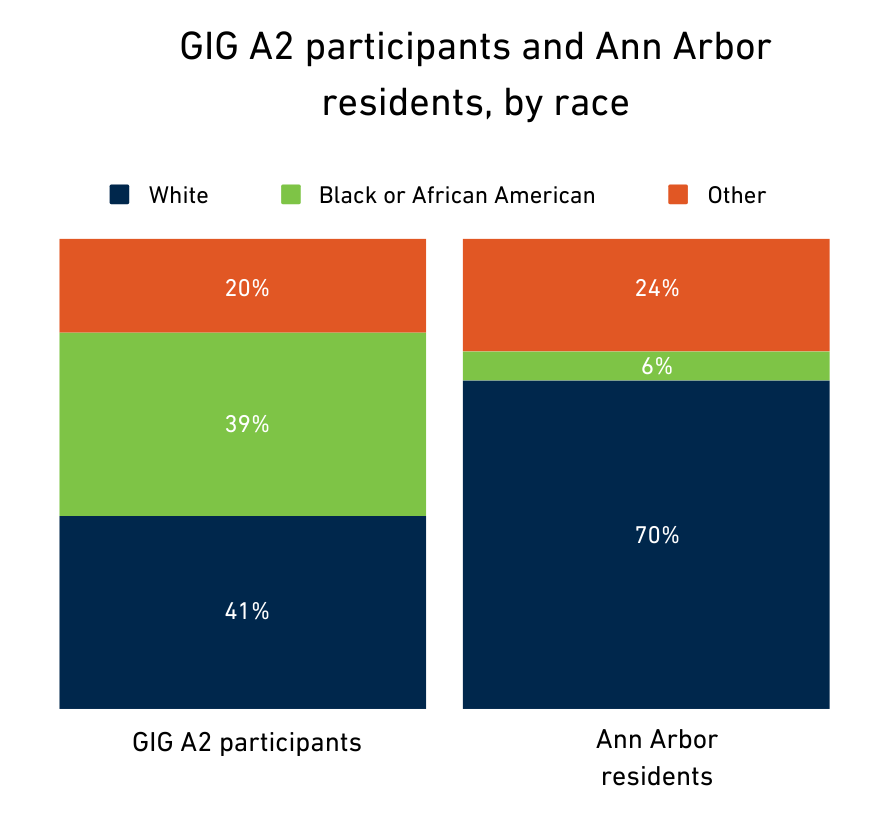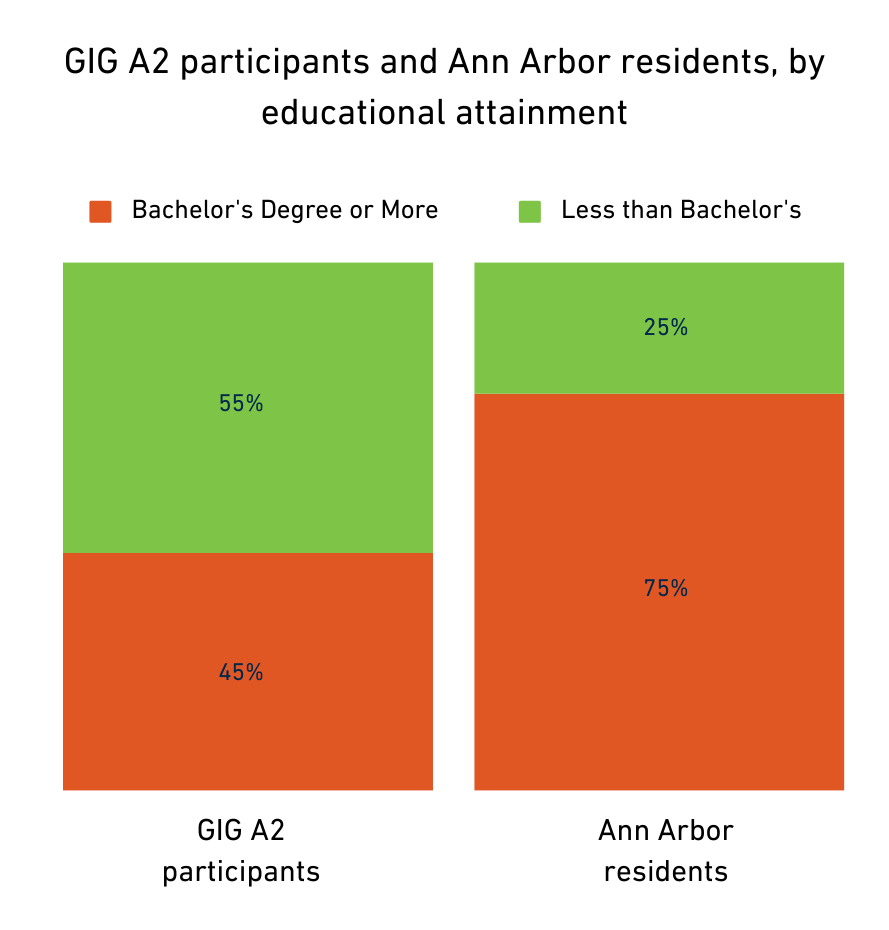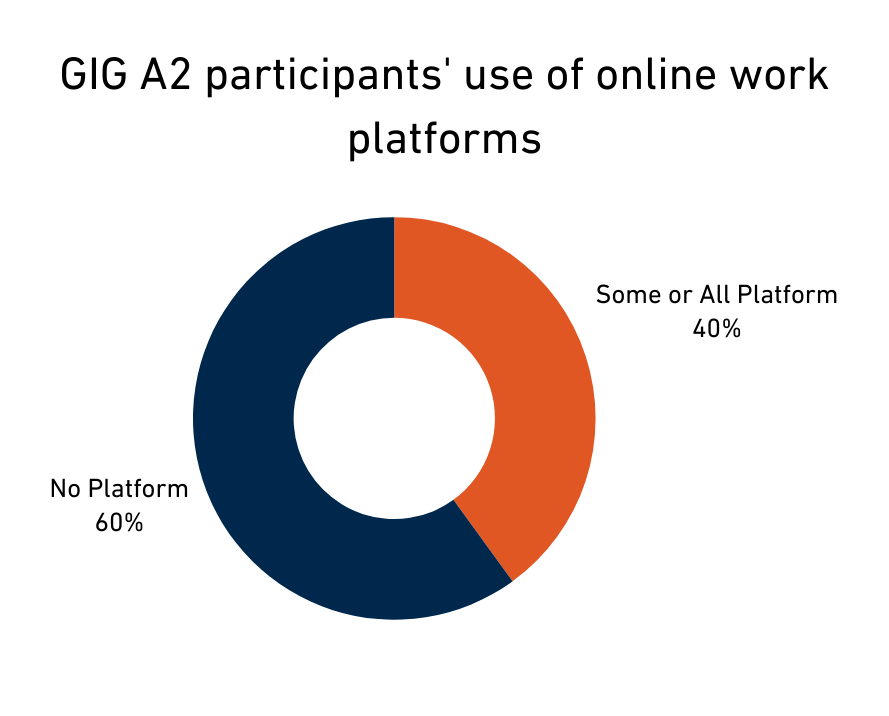Payments begin for 100 low-income entrepreneurs in Guaranteed Income to Grow Ann Arbor pilot

Poverty Solutions Associate Faculty Director Kristin Seefeldt (left) and Graduate Student Research Assistant Emily Shupp Parker (center) share information on Guaranteed Income to Grow Ann Arbor at the Green Fair in downtown Ann Arbor on Sept. 22, 2023. (Lauren Slagter | Poverty Solutions)
Contact: Lauren Slagter, lslag@umich.edu
ANN ARBOR – One hundred Ann Arbor entrepreneurs, gig workers, and other independent workers with low incomes have received their first two guaranteed income payments of $528 as part of the Guaranteed Income to Grow Ann Arbor (GIG A2) pilot program. Payments started in January and will continue monthly through the end of 2025.
Poverty Solutions at the University of Michigan will evaluate the pilot program to determine whether the monthly payments:
- Positively contribute to participants’ social determinants of health, specifically through increased housing, food, and transportation security, improvements in physical and mental health and access to care, and improvements in access and quality of child care;
- Help small businesses and entrepreneurs stabilize and/or grow their businesses; and
- Allow entrepreneurs the time and resources to focus on their business.
Another 100 Ann Arbor entrepreneurs with low incomes who will not receive the monthly payments have been enrolled into the research group to support the research findings from this pilot.
“I’d like to give a special thanks to those participating in the research group, as they play a valuable role for us to compare outcomes between the two groups and draw more robust conclusions about the potential impact of receiving a guaranteed income payment as an entrepreneur,” said Kristin Seefeldt, the principal investigator for the research study, an associate professor of social work and public policy, and associate faculty director of U-M’s Poverty Solutions.
“The research findings will inform policymakers on the effectiveness of cash assistance programs and better ways to provide assistance for people who may need it,” Seefeldt added.
Funds for this pilot program come from the federal American Rescue Plan Act (ARPA) through the City of Ann Arbor and the Ann Arbor Area Community Foundation (AAACF).
“We are delighted this important program is up and running, and grateful for our partnership with the University of Michigan to make it happen,” said Mayor Christopher Taylor. “Guaranteed income is an idea whose time has come. I’m proud that Ann Arbor is able to support these individuals and their families and also work with researchers to answer important questions about the efficacy and impact of these programs.”
“We are inspired by the opportunity to join forces on this vital initiative, supporting entrepreneurs and small business owners in need,” said Shannon Polk, president and CEO of the Ann Arbor Area Community Foundation. “By leveraging the University of Michigan’s research data to provide guaranteed income, we are not only supporting families but also embracing the transformative impact of collaborative community partnerships.”
Additional support for this pilot program comes from Steady, the payment distributor; research assistants from U-M’s School of Social Work, Ford School of Public Policy, and School of Public Health; and many community organizations in Ann Arbor and at the state level.

The chart shows the racial demographics of GIG A2 participants and Ann Arbor residents. Graphic by Dana Schau
The 200 GIG A2 participants are entrepreneurs, small business owners, and gig workers with low incomes who live in Ann Arbor. For this pilot, low income means within 225% of the federal poverty line, or $44,370 for a two-person household. GIG A2 participants were randomly selected to reflect the demographics of the eligible application pool of about 500 people. A demographic breakdown of eligible GIG A2 applicants is below:
- Race/Ethnicity: 41% of participants are White, 39% are Black, and 20% specified another race or ethnicity.
- Education: 55% of participants do not hold a bachelor’s degree, 45% hold a bachelor’s degree or higher.
- Type of Work: 60% of participants do not use a platform or app for their entrepreneurial work, 40% of participants use a platform or app like Uber, DoorDash, TaskRabbit, Fiverr, or YouTube. GIG A2 participants work in the following sectors: food and events, arts and entertainment, personal and health care services, maintenance work, and a variety of other kinds of work.

 Over the next two years, GIG A2 participants will partake in surveys and interviews as part of the research study. GIG A2 participants who are not receiving the guaranteed income payments will be paid a small stipend, starting in March from funds contributed by AAACF, for participating in the research study until the end of 2025.
Over the next two years, GIG A2 participants will partake in surveys and interviews as part of the research study. GIG A2 participants who are not receiving the guaranteed income payments will be paid a small stipend, starting in March from funds contributed by AAACF, for participating in the research study until the end of 2025.
To receive a quarterly email newsletter with updates on GIG A2, please sign up here.
Press release written by Emily Shupp Parker
